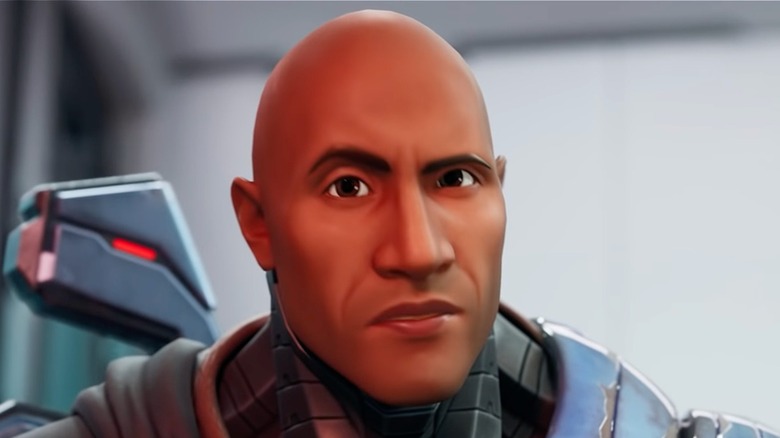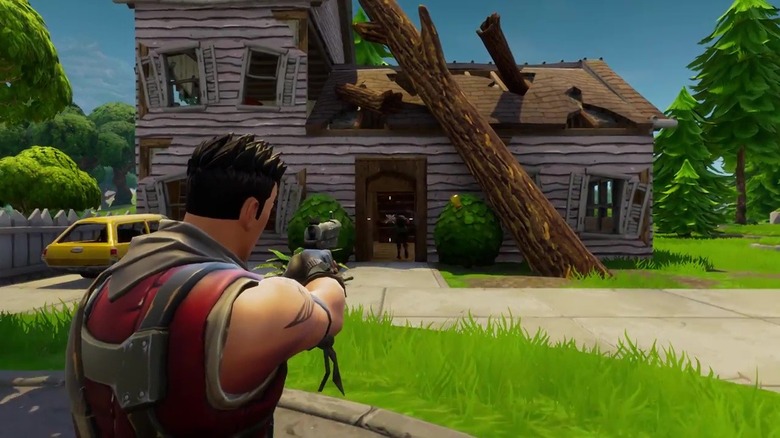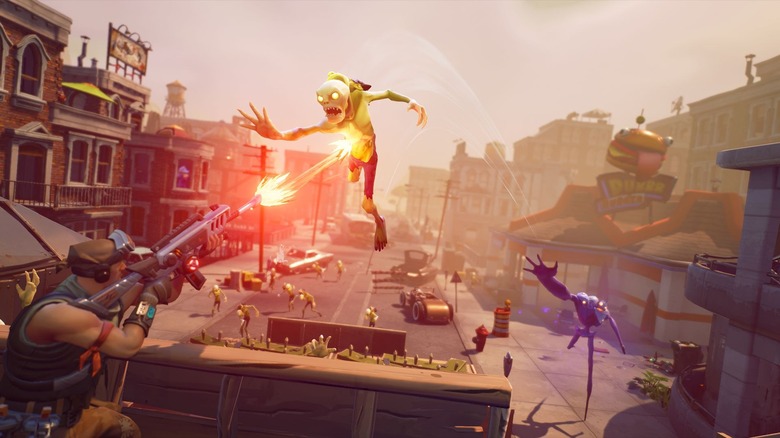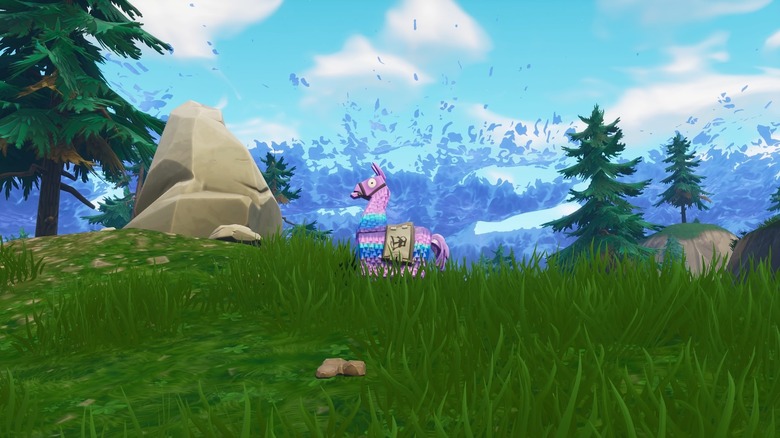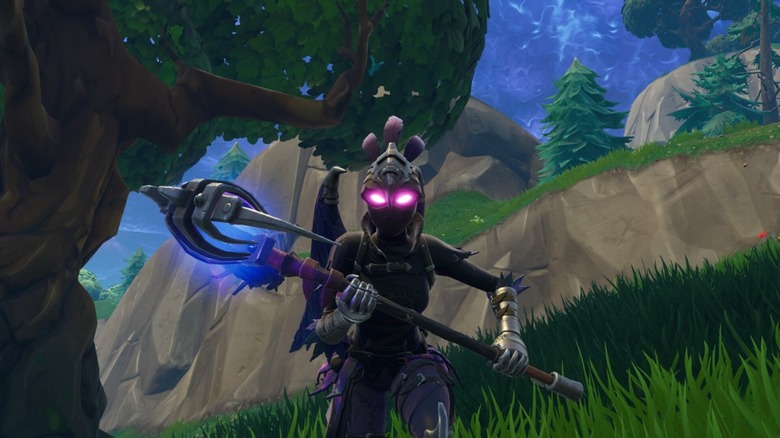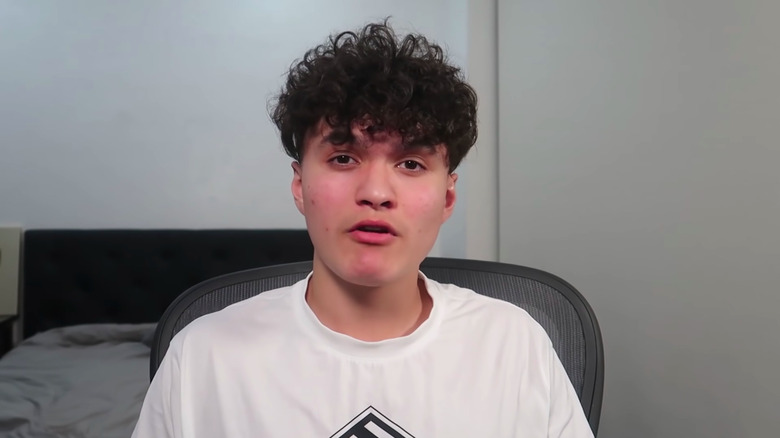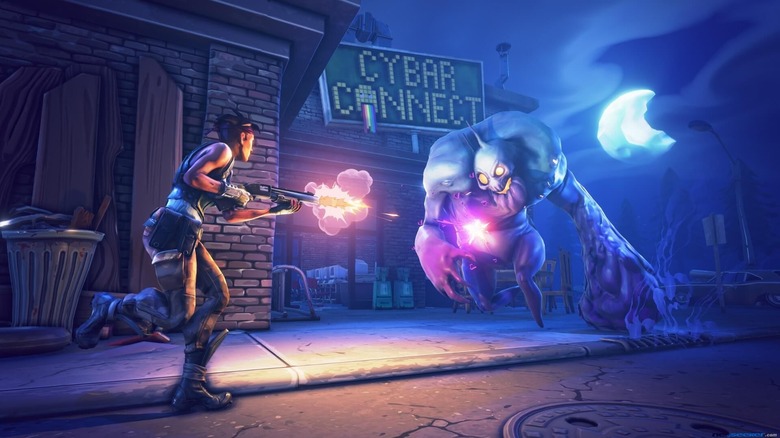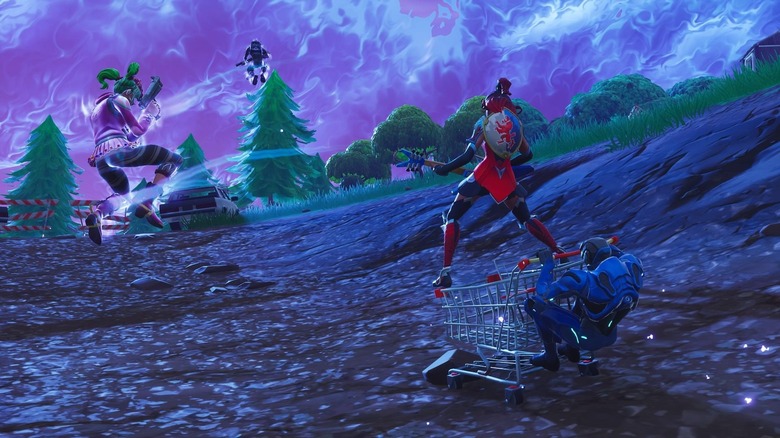The Biggest Cheating Scandals In Fortnite's History
Following its release in 2017, Epic Games' "Fortnite" quickly became one of the most popular titles in the world by simultaneously appealing to younger audiences with its goofy aesthetics and inspiring a following of serious gamers with its competitive gameplay. The game's popularity has given rise to a number of major tournaments, including the "Fortnite" Championship Series (FNCS) and the World Cup.
As with any incredibly popular competitive game, "Fortnite" has seen its share of scandals. Players and commentators always have something to be upset about, whether it's issues with crossplay, stolen emote moves, or lawsuits. And for all the wild scandals that have rocked "Fortnite" in its time, the most high profile ones tend to revolve around cheating.
There's no shortage of ways to cheat in the game — and apparently no shortage of people willing to give it a try, even in major competitions with thousands of viewers and millions of dollars on the line. Fans have criticized Epic for its handling of cheaters, with some feeling the company takes it too seriously and others feeling Epic doesn't take cheating seriously enough. With that in mind, here are the biggest cheating scandals in "Fortnite" history.
Swingset glitch bans
No one wants to play a competitive game that's overrun with hacks and cheats, but enforcing anti-cheating policies can occasionally lead to disastrous mistakes. Epic learned this firsthand back in 2017 when it made a major push to crack down on players using cheats in "Fortnite." Because there are far too many "Fortnite" players for human moderators to keep an eye on everyone, Epic relies on cheat detection software, but the game's 2017 update led to a huge spike of players getting banned for false positives (via PC Invasion). Players quickly began uploading videos of the rounds leading up to their bans and discovered those bans frequently came from interactions with swingsets.
Many "Fortnite" players took to Reddit to discuss their bans. A common glitch in "Fortnite" at the time allowed players to swing around wildly on swingsets around the map. Epic's cheat detection software flagged the impossibly quick movement as cheating and banned players accordingly.
Epic advised players to avoid swingsets on the map until a solution for the problem could be developed. Later, the company amended its policy and simply kicked players from their current game for false positives. Previous bans were repealed. Over time, the game was able to return to normal. Though no lasting damage was done to the game, this was one of the game's earliest notable "cheating" scandal.
Cheating by accident
Can you cheat without trying? FaZe Clan player Nate Hill and former Dusty Dog Club member FunkBomb would say yes. Both of them received bans during a Fall Skirmish event in 2018, when FunkBomb gave Hill some insider info during a livestream (via Dot Esports).
The situation seemed pretty clear-cut: FunkBomb got killed during the event, but continued spectating over the stream. At one point, he called out another player's low health and position to Hill, giving his partner the upper hand in the match, which led to the bans.
FunkBomb took to Twitter to explain the situation and apologize to his fans. He said that he made the callout while "not fully realizing there was zero delay on the main stream." Hill went on Reddit to apologize and to defend FunkBomb, writing,"It was a mistake and a big one at that, but I hope others realize it wasn't malicious."
When the game ended, FunkBomb reached out to Epic to confess his mistake, and the developer responded quickly. Because it seemed like a genuine mistake, neither FunkBomb nor Hill were issued career-ending bans. Still, Hill was barred from participating in Fall Skirmish events from September 24th to October 11th. Meanwhile, FunkBomb, who'd really been the one to break the rules, was permanently banned from all Fall Skirmish events and lost his membership in the Dusty Dog Club.
Sekosama wins Fortnite Championship Series
When Epic makes a bad call, the "Fortnite" community will typically band together and come to the defense of a wronged player. In 2020, however, no one was speaking out on behalf of Sekosama. According to PC Gamer, Sekosama is a Japanese player who was banned after winning the FNCS Invitationals competition in Asia. "Fortnite" invitationals round up the world's best players and put them head to head in Solo matches to determine who gets to move on to the Championship Series.
Sekosama had rocketed his way to the top of his Solo competition, walking away from the final match with $15,000 in prize money and an invitation to the FNCS. However, the sweet victory was short lived. Clips from Sekosama's game revealed another player was looting health packs and leaving them in places for Sekosama to recover. This kind of "teaming" is explicitly banned by Epic, and the company responded swiftly to the reports of Sekosama's cheating.
Sekosama was subsequently stripped of his winnings, and he received a 14-day ban from the game. The FNCS Invitational Asia title was handed to the second place player, qjac, who had come in just seven points behind Sekosama without any kind of outside assistance.
Sometimes it pays to cheat
Epic has dashed the competitive dreams of cheaters time and time again, but back in 2019, the developer somehow allowed two cheaters to make their way into the World Cup. Polygon reported that Epic banned two players, XXiF and Ronaldo, after investigating claims that other players were feeding them kills, each of which granted points towards qualifying for the Cup.
Unfortunately, Epic didn't ban the duo long enough to avoid controversy. After just 14 days, both players returned to competitive play. They only missed one Solo and one Duos qualifier, and both XXiF and Ronaldo performed well enough in the following competitions that they still qualified for the World Cup.
The "Fortnite" community erupted in outrage. By simply qualifying for the Cup, XXiF and Ronaldo were guaranteed a $50,000 payday. Streamer and Official World Cup commentator DrLupo voiced his disappointment with Epic's decision on Twitter, writing, "A cheater qualifying for a $30,000,000 tournament is a kick in the junk to the integrity of the 'Fortnite' competitive community."
At the World Cup, which took place in New York, the crowd booed whenever XXiF and Ronaldo got screentime and cheered whenever either of them were killed in-game (via ESPN). "We knew it was going to happen," Ronaldo said, adding, "What people think about us, I don't really care. It doesn't affect me." In the end, the two of them placed 28th at the Cup, but many fans still think that their opportunity to compete at all will encourage more cheating in tournaments.
Takened banned twice
In 2021, YouTuber and Twitch streamer Takened stirred up "Fortnite" controversy when he got himself banned on two separate accounts. Takened had tens of thousands of subscribers on both of his active platforms, and he played "Fortnite" competitively, but that all changed when he failed to qualify for the FNCS.
He decided to download cheats for the game, and was promptly banned before he could even get into a match. Not long after that, Takened started an alternate account and continued to use cheats while streaming and uploading videos to YouTube. Eventually, Takened's alternate account was outed via Twitter by another "Fortnite" player, Jerian, and the whole situation came to a head.
In the wake of his second ban, Takened posted a video explaining the situation from his perspective. He owned up to cheating in the game, saying that after the stress of not qualifying for the FNCS, he decided to cheat because he planned on quitting "Fortnite" anyway. Takened explained that after the first ban, Jerian checked his PC for cheats and found none, because "[Takened] deleted everything before [Jerian] could check it."
Takened said that upcoming college applications and his waning interest in "Fortnite" motivated him to cheat, his plan being to squeeze as much cash out of streaming as possible before leaving it all behind. He said that he hopes fans will be able to forgive him someday, but he's been inactive in the game ever since.
Banning a champion
One player's cheating can end up having negative effects for multiple people. Kalvin "KEZ" Dam's teammates found that out the hard way during 2020's Frosty Frenzy tournament.
After several successful games with his partners Nanolite and CizLucky, KEZ was banned from "Fortnite" in the middle of a match. The ban generated plenty of buzz on Twitter, but KEZ wasn't around to see it: Just minutes after Epic kicked him from the game, he deleted his Twitter account and went AWOL (per Fortnite Tracker).
KEZ's ban particularly irritated "Fortnite" fans, as just a year earlier he had won $187,500 in the FNCS Grand Final. According to screenshots released in the aftermath of KEZ's ban, the champion allegedly spent some of that prize money on a "softaim" cheat that was designed to improve a player's accuracy without alerting Epic's cheat detection software. Clearly, Epic was one step ahead of cheat designers in this instance.
FaZe Jarvis ban
One of the most high-profile "Fortnite" bans in the game's history came in 2019 when FaZe Jarvis was permanently banned for cheating. Jarvis built a massive following of nearly 2 million YouTube subscribers by playing "Fortnite" and creating content based around his performance in the game. Unfortunately, Jarvis got so caught up in making entertaining content that he forgot to consider the rules.
Jarvis explained on his YouTube channel that he was permanently banned from "Fortnite" for using an aimbot in a video. As he told his fans, he'd only used the aimbot to make a fun video for his channel. He never used the bot in a tournament, but Epic has a zero tolerance policy on cheating.
After the ban, several high profile streamers, including Ninja, spoke out in FaZe Jarvis' defense. No one managed to change the minds of people at Epic. The company stood its ground, and Jarvis was never allowed to return to "Fortnite."
As much as the ban upset Jarvis, it didn't ruin his career or his YouTube channel. Shortly after the banhammer fell, Jarvis uploaded a bizarre rap video getting into the issue, then began pivoting to boxing content and prank videos. Two years later, his channel was still doing just five at nearly 5 million subscribers. Jarvis' ban was one of the biggest "Fortnite" scandals of 2019, but it looks like he made it work for him.
Punishment doesn't always fit the crime
As fans have noticed, Epic is nothing if not inconsistent. When XXiF and Ronaldo cheated during the World Cup qualifiers, they were banned for 14 days. When FaZe Jarvis used an aimbot in a regular game while creating a YouTube video, he received a lifetime ban. When four players cheated during a 2020 FNCS, Epic decided to shoot straight down the middle and ban them all for 60 days (via Fortnite Tracker).
The case, at least in Epic's opinion, was a clear cut example of cheating. The top two Duos teams in the series – Keys & Slack and Bucke & Kreo – were caught colluding to kill off other teams during a Championship Series that could be worth up to $5 million.
Epic acted quickly, delivering 60 day bans from tournaments and arena play. The "Fortnite" community spoke up once again, with major players like Ninja came out to criticize Epic's decision. Though most agreed that cheating had definitely occurred, there was some disagreement about whether or not Epic had gone far enough in its punishment. Both duos were allowed to keep the prize money they had already earned in the series, which didn't sit right with others in the competitive "Fortnite" community.
Going to court
Every player who gets banned from "Fortnite" has a slightly different experience, but most don't end up in court for cheating in a video game. That's what happened when Epic Games sued Brandon Lucas, the man behind the Golden Modz YouTube channel, for copyright infringement (via Torrent Freak). As the channel name implies, Golden Modz primarily uploaded videos highlighting mods, cheats, and hacks for popular games like "Fortnite." When the channel came to Epic's attention, the company sent takedown notices to YouTube that Lucas later appealed, which led Epic to take him to court.
After four months of negotiations, Lucas and Epic reached an undisclosed settlement in March 2019. A stipulated order filed in the North Carolina District Court says that Lucas caused "Epic great and irreparable injury that cannot be fully compensated or measured in money." That might imply that Lucas got off easy, with his only lasting punishment being a permanent injunction on developing or posting cheats for "Fortnite" or any other game developed by Epic.
This case is a sign that Epic is fully willing to come down hard on cheaters when the company feels real damage is being done to "Fortnite." This clearly hasn't stopped individual gamers from trying to get away with cheating, but it may have curbed how often cheats get advertised on YouTube.

